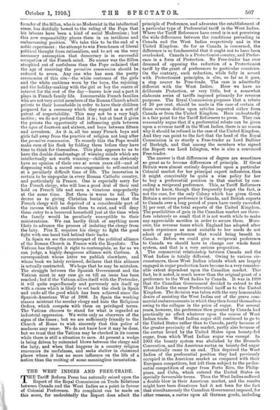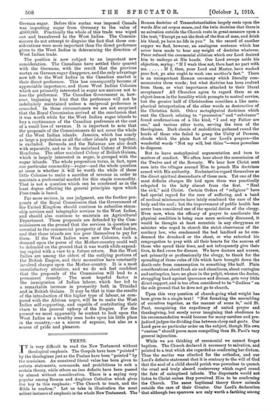'11.111 WEST INDIES AND FREE-TRADE.
THE Tariff Reform Press has naturally seized upon the Report of the Royal Commission on Trade Relations between Canada and the West Indies as a point in favour of Colonial Preference. No complaint can be made on this score, for undoubtedly the Report does admit the principle of Preference, and advocates the establishment of a particular type of Preferential tariff in the West Indies. Where the Tariff Reformers have erred is in not perceiving the wide differences between the conditions prevailing in Canada and the West Indies respectively and in the United Kingdom. So far as Canada is concerned, the difference is so fundamental that it ought not to have been overlooked. Canada is a Protectionist country, and Prefer- ence is a form of Protection. No Free-trader has ever dreamed of opposing the reduction of a Protectionist tariff by the grant of preferences to particular countries. On the contrary, such reduction, while fully in accord with Protectionist principles, is also, so far as it goes, a step nearer to Free-trade. The case is admittedly different with the West Indies. Here we have no deliberate Protection, or very little, but a somewhat elaborate series of tariffs imposed primarily for revenue purposes. The Royal Commission proposes that a rebate of 20 per cent. should be made in the case of certain of these revenue duties upon articles imported either from Canada or from the United Kingdom. Here undoubtedly is a fair point for the Tariff Reformers to press. They can reasonably argue that if a preferential rebate can be given upon a revenue tariff in the West Indies, there is no reason why it should be refused in the case of the United Kingdom. And they can point to the fact that the head of the Royal Commission is so sturdy a Free-trader as Lord Balfour of Burleigh, and that among the members who signed the Report was Lord Islington, who is also a convinced Free-trader.
The answer is that differences of degree are sometimes so great as to become differences of principle. If Great Britain were almost entirely dependent upon a particular Colonial market for her principal export industries, then it might conceivably be quite a wise policy for her to buy a preferential position in that market by con- ceding a reciprocal preference. This, as Tariff Reformers ought to know, though they frequently forget the fact, is not the case, for the only Colony which has given Great Britain a serious preference is Canada, and British exports to Canada over a long period of years have rarely exceeded 31 per cent. of the total exports of the United Kingdom. The possibilities of gain in the Canadian market are there- fore relatively so small that it is not worth while to make any appreciable sacrifice in order to secure them. More- over, the revenue taxes which England has adopted after much experience as most suitable to her needs do not admit of any preference that would bring benefit to Canada. Before we could give a reciprocal preference to Canada we should have to change our whole fiscal system, and that is a very serious proposition.
The commercial relationship between Canada and the West Indies is totally different. Owing to various cir- cumstances, those West Indian islands which are largely engaged in sugar production have become to a very consider- able extent dependent upon the Canadian market. Thie fact, be it noted, is much newer than the original grant of a preference to the West Indies by Canada. It was in 1898 that the Canadian Government decided to extend to the West Indies the same Preferential tariff as to the United Kingdom. The decision was taken with the very honourable desire of assisting the West Indies out of the grave com- mercial embarrassments in which they then found themselves owing to the collapse in the price of sugar. For several years, however, the preference then granted by Canada had practically no effect whatever upon the course of West Indian trade. West Indian sugar still continued to go to the United States rather than to Canada, partly because of the greater proximity of the market, partly also because of the surtax levied by the United States upon bounty-fed sugar, from which West Indian sugar was exempt. In 1903 the bounty system was abolished by the Brussels Convention, and the American surtax on bounty-fed sugar automatically came to an end. This deprived the West Indies of the preferential position they had previously occupied in the American market as compared with their European competitors, but left them subject to the prefer- ential competition of sugar from Porto Rico, the Philip. pines, and Cuba, which entered the United States on specially favourable terms. Thus the West Indies suffered a double blow in their American market, and the results might have been disastrous had it not been for the fact that simultaneously the Canadian Government imposed, for other reasons, a surtax upon all German goods, including German sugar. Before this surtax was imposed Canada was importing sugar from Germany to the value of £600,000. Practically the whole of this trade was wiped out and transferred to the West Indies. The Commis- sioners do not attempt to disguise the fact that these con- siderations were more important than the direct preference given to the West Indies in determining the direction of West Indian trade.
The position is now subject to an important new consideration. The Canadians have settled their quarrel with the Germans, with the result that the previous surtax on German sugar disappears, and the only advantage now left to the West Indies in the Canadian market is their direct preference. This has consequently become of appreciable importance, and those West Indian Colonies which are primarily interested in sugar are anxious not to lose the preference. The Canadian Government is, how- ever, beginning to hint that the preference will not be indefinitely maintained unless a reciprocal preference is , conceded. In these circumstances we are not surprised that the Royal Commission arrived at the conclusion that it was worth while for the West Indian sugar islands to buy a continuance of the Canadian preference at the cost of a small loss of revenue. It is important to note that the proposals of the Commissioners do not cover the whole of the West Indian islands. Jamaica, which has nearly as large a population as all the other islands put together, is excluded. Bermuda and the Bahamas are also dealt with separately, and so is the mainland Colony of British Honduras. The other mainland Colony of British Guiana, which is largely interested in sugar, is grouped with the sugar islands. The whole proposition turns, in fact, upon one particular commodity—sugar—and the whole question at issue is whether it will be worth the while of these little Colonies to make a sacrifice of revenue in order to maintain a preferential market for this staple commodity. That is not a question which can be construed as in the least degree affecting the general principles upon which Free-trade is based.
Far more serious, in our judgment, are the further pro- posals of the Royal Commission that the Government of the United Kingdom should continue to subsidise steam- ship services and telegraphic services to the West Indies, and should also continue to maintain an Agricultural Department. These proposals are defended by the Com- missioners on the ground that the services in question are essential to the commercial prosperity of the West Indies, and that those islands are too poor themselves to pay for them. If the West Indies were new Colonies, such a demand upon the purse of the Mother-country could well be defended on the ground that it was worth while expend- ing capital with a view to a future return. But the West Indies are among the oldest of the outlying portions of the British Empire, and their necessities have constantly involved charges upon the Mother-country. It is a most unsatisfactory situation, and we do not feel confident that the proposals of the Commission will lead to a permanent remedy. The most hopeful factor is the immigration of Indian labour, which has led to a remarkable increase in prosperity both in Trinidad and in British Guiana. It may be that in time the results of the introduction of this higher type of labour, as com- pared with the African negro, will be to make the West Indies self-supporting, and capable of contributing their share to the general upkeep of the Empire. For the present we must apparently be content to look upon the West Indies as a wealthy man looks upon his little place in the country,—as a source of expense, but also as a source of pride and pleasure.



























































 Previous page
Previous page